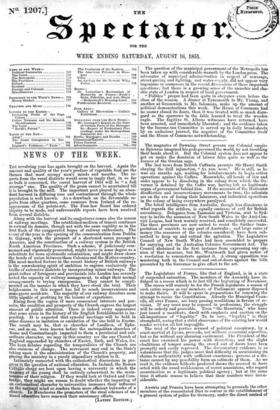NEWS ' OF THE WEEK.
THE revolving year has again brought- on the harvest. Again the amount and quality of the year's produce of vegetable food are the themes that most occupy men's minds and mouths. The re- ports from the rural districts would seem to imply that, in so far as bulk is concerned, the cereal harvest of 18M will be " a full average" one. The quality of the grain cannot be ascertained till it is brought to the milL The important part played by an abun- dant harvest in diffusing ease and contentment through the whole population is well known. As a drawback on the favourable re- ports from other qiiatters, come ruinours 'from Ireland of the re- appearance of the potato-rot. The Poor-law Board has ordered Inquiry to be made, and unfavourable reports have been received from several-districts.
Along with the harvest .and its conjectures comes also the season of railway meethigs. The established medium of transit continues to extend its domain, though not with the same rapidity as in the first flush of the exaggerated hopes of railway enthusiasts. The event of the year is the opening of the communication from Dublin to Galway, with the prospect of a shortened ocean passage to America, and the construction of a railway system in the British North American Provinces. Such a scheme, if judiciously com- menced and vigorously prosecuted, might 'serve in some degree as a Substitute for more systematic colonization; and might draw closer the bonds of union between these Colonies and the Mother-country. The most marked feature in the recent history of British railways is lhe reawakening spirit of ambition to engross exclusively the traffic of extensive_distaicts by incorporating minor railways. The great influx of foreigners and provincials into London has severely tested the capacity of railway management, to adapt their normal arrangements to trying emergencies. They cannot be compli- mented-on the manner in which they have stood the trial. Their helplessness in this respect has led to much inconvenience and some grave accidents. The majority of our railway directori seem little capable of profiting by the lessons of experience. Rising from the region of mere economical interests and pur- suits, the condition and prospects of the Church engross the largest amount of public attention. There is indeed every appearance that some crisis in the history of the English Establishment is im- pending. It is expected that synodal meetings will be held in other dioceses in imitation or emulation of the one held hi Exeter. The result may be, that as churches of Laodicea, of Ephe- Sus, and so on, were known before the metropolitan churches of Rome and Constantinople imparted to them a provincial and sub- ordinate character, we may in this country see the one Church of England superseded by churches of Exeter, Bath, and Wales, &e. The keen debates regarding the temporalities of the Church are also ominous of change. The movement may end in the State's taking upon it the administration of the Church's property, and placing the ministry in a purely stipendiary relation to it.
Intimately connected with the ecclesiastical discussions in pro- ess is the question of national education. In Ireland, the Roman
athelie clergy are bent upon having a university in which the training of the young shall be entirely subservient to the main- tenance of their religion. If they would look at Oxford and Cam- bridge, they might see reason to doubt whether the imparting of an ecclesiastical character to universities increases their influence on the national mind or renders them more efficient bulwarks of a church. In Manchester the promoters of the rival schemes of na- tional education have renewed their missionary efforts. The question of the municipal government of the Metropolis has been taken up with considerable warmth by the London press. The advocates of municipal administration in respect of sewerage, street-paving and lighting, and water-supply, did not appear very ingenious or numerous in the recent discussions of these important questions; but there is a growing sense of the anarchic and cha- otic state of London in respect of local government. " Politics " proper had been quite in abeyance even before the close of the session. A dinner at Tynemouth' to Mr. Young, and another at Greenwich to Mr. Salomons, make up the amount of political demonstrations this week. The House of Commons had no sooner closed its doors, than it was treated with as much disre- gard as the sparrows in the fable learned to treat the wooden eagle. The fugitive St. Albans witnesses have returned, have been arrested, and immediately liberated ; and the evidence taken by the Income-tax Committee is served up in daily broad-sheets by an audaciousjournal, the negative of the Committee itself and the House of Commons notwithstanding.


























